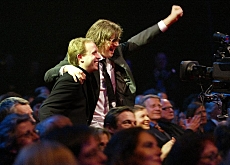Local films appeal to Swiss moviegoers
The Swiss generally hold local films in high esteem, a survey has shown, although German speakers are more likely to go and see a domestic production.
French speakers are somewhat less enthusiastic, a difference the survey’s authors say is due to popular German-language films failing to find an audience elsewhere.
The survey, the first of its kind in Switzerland, was carried out for the Federal Culture Office. According to Nicolas Bideau, head of the office’s cinema section, nobody actually knew what the Swiss expected from movies.
“This survey will serve as a base for future discussions about a more professional approach to subsidising locals films,” he told swissinfo.
The survey showed that three out of four Swiss enjoy seeing movies.
“On average, each person goes to see 2.4 films annually at the cinema,” said Olivier Moeschler, the Lausanne University sociologist who prepared the survey. “Only the French are more enthusiastic.”
Despite this, most films are actually watched on television. While 75 per cent of those surveyed said they go to the cinema at least once a year, they also admitted to sitting down and watching a movie on the box at least once a week.
Documentaries
The Swiss say they prefer documentaries – a national speciality – although French speakers have a predilection for comedies.
“For the Swiss, movies must reflect reality,” Moeschler told swissinfo.
But even if their preference is for documentaries, Swiss film buffs are more likely to opt for entertainment, especially comedies and adventure movies.
The good news for Swiss filmmakers is that movie viewers like domestic productions, even if French speakers are less enamoured of local films than German speakers.
When asked what they thought of Swiss movies, nearly three out of four German speakers said they had a positive opinion of home-grown films. This dropped to one in two of French speakers.
“I think if we had carried out this survey a few years ago, the difference wouldn’t have been as big,” said Moeschler. “Recently, there has been a revival of cinema in German-speaking Switzerland with comedies like ‘Ready, steady, Charlie!’ that appeal to a wider public.”
Miracle
Bideau says this has been nothing less than miraculous.
“Six years ago, German-speaking filmmakers decided they had to attract a public,” he added. “They began making films – not always great ones – that appealed to people.”
Bideau reckons these directors and producers managed to create ties with moviegoers by giving viewers what they wanted. “Now they don’t have to seduce anybody because of this relationship,” he told swissinfo.
But appealing to all of Switzerland has proven to be a harder nut to crack so far.
Only Jean-Stéphane Bron’s documentary film, “Mais im Bundeshuus”, about a group of parliamentarians working on a genetics law, and Michael Steiner’s fictionalised account of the last days of airline Swissair, “Grounding”, have drawn crowds on both sides of the language divide recently.
swissinfo, Alexandra Richard
The survey on film-viewing habits was carried out in January.
1,400 people were questioned, 700 in French-speaking Switzerland, and 700 in the German-speaking part of the country.
Movie viewing habits in Italian-speaking Switzerland will be studied at a later date.
In 2005, nearly one million tickets for locally made films were sold in cinemas across Switzerland.
This result gave domestic production a 6% market share.
90% of ticket sales for Swiss movies were in German-speaking Switzerland.
The number of viewers dropped 13% last year, but this decline did not affect local films.
With over half a million tickets sold, the locally made movie “Mein Name ist Eugen” by Michael Steiner was the third-biggest grossing film in Swiss theatres in 2005, just behind “Harry Potter” and “Madagascar”.

In compliance with the JTI standards
More: SWI swissinfo.ch certified by the Journalism Trust Initiative











You can find an overview of ongoing debates with our journalists here . Please join us!
If you want to start a conversation about a topic raised in this article or want to report factual errors, email us at english@swissinfo.ch.